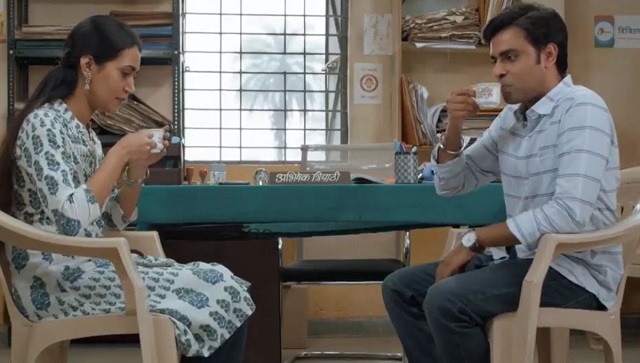In a scene from the second season of Amazon Prime Video’s Panchaayat Pradhan ji (Raghubir Yadav) tells his daughter Rinki and her friend to go have fun in the nearby town market of Fakouli, but not ‘watch any films’. In another scene, a man from the village convinces sachiv-ji ( Jeetendra) to assist a dancer in getting medical help because he cannot be ‘seen with her’. Panchaayat is set in the little-known, could-be-anywhere village of Phulera that rather than focus, defocuses from the depths of everyday conflicts through the many trivialities that makes sachiv ji and his associates’ life lightly chaotic. More than its episodic adventures and bureaucratic missteps, however, it’s the show’s reluctant illiberalism that centralises the shows characters, their beliefs as not the margin, but the heart of this country. It’s what actual India looks, talks and thinks like and in the age of performative wokeism, Panchaayat’s second season feels like the cool draught blowing past Phulera’s fields in the peace of night. The second season is punctuated by disputes that though seemingly insignificant aren’t necessarily without consequence. The story of the second season, however, is framed through the perspective of the village its people rather than the outsider trying to fit in. It’s where the landscape truly takes over and envelops sachiv-ji’s concerns, his motivations to rid his life of small-town India’s vagaries. This is the India that likes to nap during the day, won’t overcommit to rudimentary tasks and is okay to allow mandates to pile up at the corner of the desk. In this world of modest ambition but near gross satisfaction, Abhishek (Jeetendra’s character) is an exception, struggling to actually stress less. He wants to get an MBA, a giant pay package and motor his way out of a place that seems to always be crumbling but never quite does. In this second season he dissolves into Phulera’s story and ceases to be the pivot on which the show usually turns. It’s how nations are built, but more than that it is how nations become a people, a culture. And no culture exists without obscene flaws. Patriarchy, dowry, rote customs and illicit habits, Panchaayat refuses to convert rural India into a sterilized ground for the elite to claim. In one episode a driver hired to relay a message against alcoholism arrives drunk on the job. But rather than repatriate him to the land of sin, Abhishek, who usually goes ballistic in the face of moral conundrums accepts the imprudence of fate. Life’s purpose is not to dress up for consumption, but to gradually bare its pores, warts and scars to us all. We often judge based on the prerequisite of choice rather than destiny. The drunkard wakes up by nightfall and leaves, jitterly, as the entire Panchaayat team gulp down their own bottles of booze. “Ho jata hai kabhi kabhi”, he says before leaving never to be recalled or resurrected as a narrative device. It’s a simple yet inspired way of defusing the possibilities of cinema by casually stepping over it with time, allowing it to flow and subsequently be forgotten, as if to acknowledge the fallacy of control. There is a joke about ‘controlled drinking’ that soon follows. The second season of Panchaayat isn’t as cyclically convenient as the first. Not everything finds a resolution and neither are presumptively woke ideas fleshed to satiate the need for something revelatory. It is what cinema has become these days – small-town woes being corrected, overturned or repurposed to suit saviour complexes. Panchaayat is a welcome antidote to the activism of our cinema today. Abhishek is no morality warrior longing for a world full of feminism and equality. The actual Pradhan (played by the delightful Neena Gupta) does not rise, as is teased in the first season, to iconic relevance in this new season. Normalcy or should I say, ordinariness resumes, but not without the subtle evocation of time as the only possible device. As opposed to liberal, woke ideas that would instantly want to ‘cure’ Phulera this is a worldview that feels refreshing simply by trying to not rewrite everything. Not that liberalism is wrong but that there can be progress without the tacit alarm-pressing act of heroism. The finale of this second season is a thundering, almost overwhelming reminder of the country’s commonalities. How grief invariably finds everyone, even those who have learned to walk without the baggage. That nationalism and patriotism are re-keyed into the finale, like the first season, is an ode perhaps to the universalising stories of our times. Debate we can but this is where India resides - in faith, in flags and in anthems that restore our dignity in the face of a life full of scarcity. Panchaayat is simultaneously a hilarious, warm, ephemeral show about the consolations of rural India and it is also about the lazy but ultimately telling ethos of a country that is run by hustlers, survived by dreamers and confronted by optimists. In an episode a farmer spends hours looking at CCTV footage to find his missing goat. At any given time India is both that deliriously committed farmer or that happily clueless goat, waiting to be found and maybe yearning to be loved. _Panchayat_ season two, produced by The Viral Fever (TVF), streams on Prime Video. The author writes on art and culture, cinema, books, and everything in between. Views expressed are personal. Read all the **_Latest News_** _,_ **_Trending News_** _,_ **_Cricket News_** _,_ **_Bollywood News_** _,_ **_India News_** and **_Entertainment News_** here. Follow us on Facebook_,_ Twitter and Instagram_._
Panchaayat doesn’t hide patriarchy, vice or ritual behind a smokescreen of upheaval. It is what makes the show hones, and given everything we are served by Bollywood these days, a breath of fresh air.
Advertisement
End of Article


)

)
)
)
)
)
)
)
)



